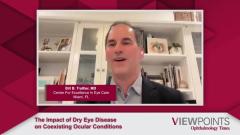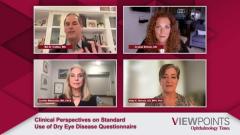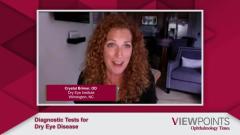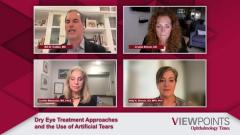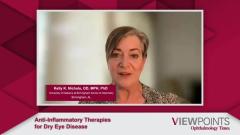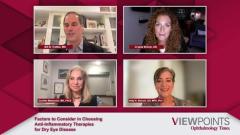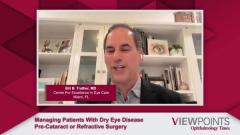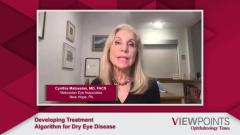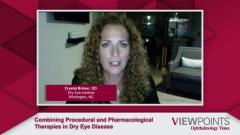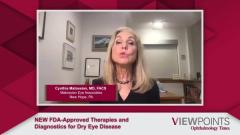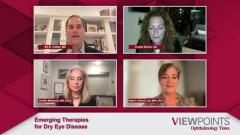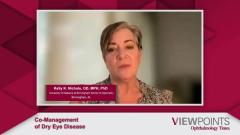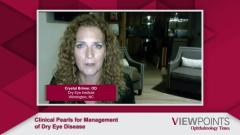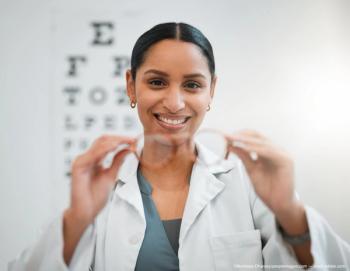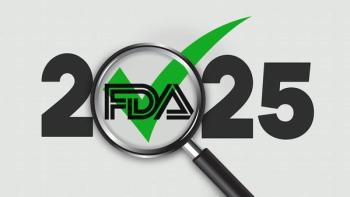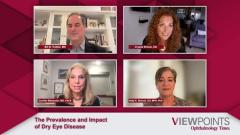
Clinical Perspectives on Standard Use of Dry Eye Disease Questionnaire
Experts offer their clinical perspectives on the use of dry eye questionnaires as a method of screening for dry eye disease (DED).
Episodes in this series

Transcript
Bill B. Trattler, MD: So, this is an interesting question. And I would say controversial, but I say that just that different people have different feelings on this. Dr. Brimer, what are your thoughts about requiring a dry eye questionnaire for all your patients that we're concerned about dry eye? Do you think it's required, what do you do in your practice, [and] can we get by and maybe skip that?
Crystal Brimer, OD: No, you can't skip a screening. Maybe it's not a questionnaire. So, it's interesting that you ask me this question, because when you say it's controversial, I'm probably going to give the opposite answer of what everybody else in a lineup would give. When I'm talking to other doctors, I want them to visualize two different scenarios. One is, okay, we gave them a questionnaire. That was great. We had a screener, and I applaud you for doing a questionnaire versus nothing. Right? It's something. So that's step one if you're doing nothing. Yeah, pull the questionnaire out. Let's do it. Because it at least it presents itself. But imagine this patient does the questionnaire and then you get them in the exam room and you say, "Oh, yeah, I see this, this is bad, and I'm going to need you to do A, B, C, and D, and it's going to take an hour or two at night, but it'll be fine and it's going to cost you about $2,000 out-of-pocket. But listen, this is what we need to do." You know, they're either going to look at you and say, "yeah, it's not that bad," or maybe they do something, but then as soon as they feel better, they stop because they believe that everything you requested them to do was based on subjective inputs. And that's what I don't want. So, while I appreciate using a questionnaire and I think it's better than nothing and it's good in a really busy practice that's just trying to bring the complaints to the surface, when you're really digging for it, I don't think it's enough because I want it to be based on objective findings. So, what we used, and we started this way back in probably 2015/2016 when we first got the oculus keratograph, but especially when the software got redesigned. We use that screener, and it's your tear meniscus height, interferometry or break up time, and redness score. So, for me, it gives me a snapshot of water, oil and inflammation. The patient gets a report, is completely objective and it just brings it to light and says, you know what, you may have symptoms, you may not, but this is progressive. And to me, that also plants a seed so that if they don't have symptoms and they don't come back for eval, they're wearing their contacts, at some point in the year they get uncomfortable, it's in the back of their mind that, "all right, let me go back and take another look." So that's my take.
Bill B. Trattler, MD: I love it. Now, that's such a great way of framing it. And also, you know, having objective technology like a keratography device that can actually give you lots of objective measurements and can really help us understand where a patient's level of dry eye is. That's fantastic that you have to have your practice. Let me ask Dr. Matossian your thoughts on questionnaires, how you view them, and maybe thoughts on Dr. Brimer's thoughts as well.
Cynthia Matossian, MD, FACS: I really liked how you framed that answer, Crystal. A lot of practitioner’s view questionnaires or surveys as a nuisance. It takes too long. It jams up the pass through or the throughput of the patients. It leads to confusion and so forth. What we were trying to do, at Matossian Eye, is do it virtually, send a survey to the patient prior to the office appointment. This way the patient, in the comfort of their home, leisurely can answer the question, and the responses were getting integrated into the EMR. This way the patient at least started to think about their environment, [ fans or, you know, whatever it might be. Fatty acids, you know, omega threes, their diet, things that they may not be able to connect the dots [on] because they don't have that background like we do. So at least it helped the patient understand that perhaps something is going on. So therefore, when the objective testing was done in the office, then all of it kind of merged together and the patient was able to better understand their diagnosis.
Bill B. Trattler, MD: I like that. Thank you. That really makes a lot of sense, [and] obviously sounds like a very good strategy. Dr. Nichols, what are your thoughts on this topic?
Kelly K. Nichols, OD, MPH, PhD: So, we do, in our setting, a little bit more survey driven work just because we're screening for a lot of dry clinical trials and there's usually a symptom cut point to get in. We want an idea whether or not they might qualify. So, we do some surveys for that purpose, but signs and symptoms don't correlate very well with one another. We all know that, and that's persisted over time. And so, a set survey doesn't really give that tailored information that you need to find out by just asking questions along with your objective tests. So, I'm imagining, Crystal, that while you're doing some of those tests, you're asking additional questions and getting additional information that's very tailored to the individual who's with you at the time. So, you know, it does provide some information as a way in the door or for a clinical trial to find out if somebody might qualify. But it's not the only thing, certainly, that you should do by any stretch.
Bill B. Trattler, MD: No, this is great. We each have some different approaches. I'll share [my approach] in my practice. I'm [not aware] in our ractice of using a questionnaire, but we do ask specific questions to patients. You know, certainly for me what I think is important is to ask different questions. And of course, I involve objective tests, as well.
Transcript is AI-generated and edited for clarity and readability.
Newsletter
Don’t miss out—get Ophthalmology Times updates on the latest clinical advancements and expert interviews, straight to your inbox.


